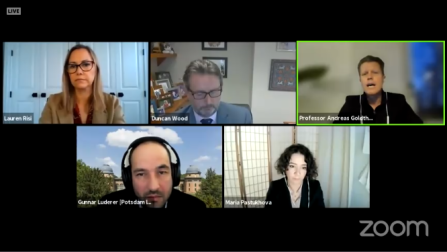Reflection: Wilson Center event on Germany after COP26
| Date |
Date
|

On November 23, 2021 the TCB co-sponsored an expert discussiona at the Wilson Center titled “Germany after COP26: Europe’s driving force to get to net-zero?” Participants deliberated on both the broad and German-specific successes and shortcomings of the Glasgow Climate Summit, what the new German government will mean for the country’s climate and energy objectives, and how the European Green Deal will shape Germany’s domestic climate policy agenda.
Panelists also spent considerable time discussing EU-US climate diplomacy and the high degree to which the world powers’ relationship will likely inform the multilateral race to net-zero through 2030. On the panel were
- Andreas Goldthau, Research Group Leader, Institute for Advanced Sustainability Studies Potsdam
- Maria Pastukhova, Senior Policy Advisor at E3G
- Gunnar Luderer, Deputy Head of Research Department, Potsdam Institute for Climate Research.
The Wilson Center’s Lauren Herzer Risi moderated the event, and opening statements were given by German Ambassador to the United States Emily Haber and Head of Division at the German Federal Ministry for the Environment, Nature Conservation and Nuclear Safety Vera Rodenhoff.
Ambassador Haber noted that Glasgow represented the first time a COP declaration had talked about phasing-down coal. She also highlighted the importance of removing subsidies for fossil fuels and expressed her pleasure that the US was "back" in climate talks.
Ms. Rodenhoff said there was still work to do to get to 1.5C, but commented on all the positive pledges from COP26, from the pledges on limiting deforestation to reducing methane emissions. "Certainly now is the time for implementing these pledges," Rodenhoff said.
Reflecting on Germany’s unmet energy goals for the 1990-2020 period, Luderer outlined what the nation must do to meet its 2030 and 2045 emissions reductions targets. He noted that to achieve its goals, “Germany must realize a near complete phase-out of coal, a two- to threefold increase in solar and wind power, large-scale implementation of zero-carbon hydrogen and e-fuels, a transition to an electric battery dominance in new vehicle sales, a doubled pace of home refurbishment, and massive investments in zero carbon production capacities—particularly in steel, chemicals, and cement.”
Commenting on how the incoming government might rise to the occasion, Pastukhova indicated that the European Green Deal will be a driving force of Germany’s domestic climate policy developments, stating that parties to the incipient coalition possess very different ideas about how to attain net-zero in the established timeframe. According to Pastukhova, the Green Party presents the strongest platform for meeting the 2030 goals. It emphasizes a climate justice framework and the need for an economy-wide shift to renewables. While the Social Democratic Party’s long-term climate and energy goals closely align with that of the Greens, they lack a clear vision of how to achieve those ends beyond employing natural gas as a transition fuel, Pastukhova said. Conversely, the Free Democratic Party appears least equipped—and most unwilling—to take the necessary action and is projected to push for synthetic fuels in the long-term, only after exhausting all political will to maintain internal combustion engines. Accordingly, due to the parties’ disparate agendas, the regulatory impositions levied by the EU and its European Green Deal will likely have the strongest hand in influencing German climate policy for the foreseeable future.
Goldthau said several components of the political discourse will be critical to heed during the transition to net-zero. One such focal point is the role petrostates, where entire government regimes are often entrenched in political rents for fossil fuels. According to Goldthau, the moment that these countries start to decarbonize, the petrochemical-dependent, government-public social contracts present therein will deteriorate. This is most concerning in smaller countries that are less able to diversify their economies. “Not all countries will make progress as quickly as others. This could be due to political misgivings, or it could be due to structural problems. There is a growing divide between climate leaders and climate laggards. As this divide expands, those that fall most behind will suffer economically and could destabilize. An energy transition will not simply happen on its own, and climate leaders must make a concerted effort to foster this transition both domestically and internationally,” said Goldthau.
Energy partnerships like that between Germany and the US will be crucial as well, remarked Goldthau, particularly when it comes to the amount, source, and recipients of climate finance. The US and Germany, as two of the world’s largest energy financiers, will be pivotal in shaping and administering funds. However, the US-EU relationship will be just as important if not more so. Although Germany is the largest source of energy-related foreign direct investment in Europe, the EU provides more funding than the US and Germany combined. Consequently, the US-EU dyad will likely be among the largest contributors to energy finance in the future. Although promising, this partnership will inevitably be host to numerous operational conflicts. According to Goldthau, “the US’ primary goals are to create opportunities for markets in the clean energy sector. In the EU, it’s quite different. It’s most concerned with regulation. The EU is not a state—it is a regulatory body, and thus its intentions for the energy transition are fundamentally different. This could create discontent. The EU's regulatory taxonomy is not necessarily aligned with how clean investment is viewed in the US. The two might have similar long-term goals concerning the energy transition, but their methods of achieving those goals will likely be very different, and this could create unnecessary stalemates.” In aftermath of COP26, the European Union, the United States, and Germany will all have key roles to play in the race to net-zero.
Please check back for more on transatlantic climate events at the Wilson Center and beyond!
